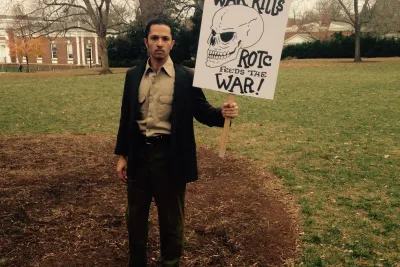Kevin Jerome Everson and Claudrena N. Harold, We Demand (still), 2016. Single-channel, video, sound, 10:19 min. Courtesy the artists and Picture Palace Pictures.
Lavine Lecture: Black Fire: The Struggle for Racial Justice in Charlottesville and Beyond, 1964 to the Present
From August 11–12, 2017, white supremacists incited two days of terror at the University of Virginia and Charlottesville. Beginning with a torchlight rally around a statue of Thomas Jefferson on the university’s grounds, the white supremacists’ violent campaign ended tragically with the killing of Heather Heyer, a local resident and anti-racist protestor. Charlottesville is but only one flashpoint in the larger resurgence of white supremacy in the United States today, throwing into tragic relief the unfulfilled promises of racial justice and equity since the passage of the Civil Rights Act in 1964.
The List Center is pleased to present Claudrena N. Harold, Professor of African American and African Studies and History at the University of Virginia, for the 2017 Lavine Lecture. Dr. Harold’s lecture Black Fire: The Struggle for Racial Justice in Charlottesville and Beyond, 1964 to the Present will reflect on the recent tragedy in Charlottesville and the longer history that precedes current struggles for racial justice. With filmmaker Kevin Jerome Everson, Harold is also a participating artist in the List Center’s current exhibition List Projects: Civil Disobedience. Their film We Demand (2016) focuses on ten days of unprecedented student protests against the Vietnam War and racial inequity at the University of Virginia in 1969, led by James Roebuck, the university’s first black student council president.
The Lavine Lecture will be followed by a conversation between Harold, Everson, and Henriette Huldisch, Director of Exhibitions and Curator, MIT List Visual Arts Center.
About the Speakers
Claudrena N. Harold is a Professor of African American and African Studies and History at the University of Virginia. Harold has authored two books, The Rise and Fall of the Garvey Movement in the Urban South, 1918-1942 and New Negro Politics in the Jim Crow South, and coedited the volume, The Punitive Turn: New Approaches to Race and Incarceration. As a part of her ongoing work on the history of black student activism at UVA, she wrote, produced, and co-directed with Kevin Jerome Everson six short films, Sugarcoated Arsenic, U. Of Virginia, Charlottesville, VA, 1976, We Demand, Fastest Man in the State, 70kg, and How Can I Ever Be Late. Her film collaborations have screened at numerous festivals and galleries, including the Berlin International Film Festival, the New York Film Festival, the International Film Festival Rotterdam, the Oberhausen International Short Film Festival, the Whitney Museum of American Art, and the National Gallery.
Kevin Jerome Everson (b.1965) was born and raised in Mansfield, Ohio. He is Professor of Art at the University of Virginia, Charlottesville. Everson was awarded the 2012 Alpert Award for Film/Video; his films has been the subject of mid-career retrospectives at the Tate Modern (2017); Museum of Modern and Contemporary Art, Seoul (2017); Viennale (2014); Visions du Reel, Nyon, Switzerland (2012), The Whitney Museum of American Art, NY (2011); Centre Pompidou, Paris (2009) and featured at the 2008, 2012, and 2017 Whitney Biennial and the 2013 Sharjah Biennial. With curator/critic Greg DeCuir Jr., Everson will co-curate the 2018 Flaherty Seminar.
Everson’s paintings, sculptures, photographs, and films—including nine features (Spicebush, 2005; Cinnamon, 2006; The Golden Age of Fish, 2008; Erie, 2010; Quality Control, 2011; The Island of St. Matthews, 2013; Park Lanes, 2015; 8903 Empire, 2016; Tonsler Park, 2017) and over 130 short form works—have been exhibited internationally at film festivals, cinemas, galleries, museums and public and private art institutions.
About the Lavine Lecture Series
The Leroy and Dorothy Lavine Lecture Series was established to honor the Lavines, two prominent Boston art patrons and longtime supporters of the MIT List Visual Arts Center. The Leroy and Dorothy Lavine Lectures bring to the Boston community distinguished art world figures for talks on modern and contemporary art.
All programs are free and open to the general public. RSVPs are required. RSVP here.
